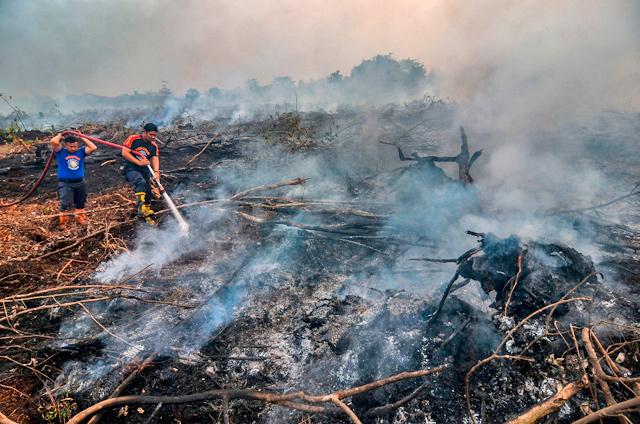You are here
World must adapt to ‘inevitable’ climate change, warns report
By AFP - Sep 10,2019 - Last updated at Sep 10,2019

This photo taken on Monday shows Indonesian firefighters battling a forest fire in Kampar, Riau (AFP photo)
BEIJING/PARIS — Nations rich and poor must invest now to protect against the effects of climate change or pay an even heavier price later, a global commission warned on Tuesday.
Spending $1.8 trillion across five key areas over the next decade would not only help buffer the worst impacts of global warming but could generate more than $7 trillion in net benefits, the report from the Global Commission on Adaptation argued.
“We are the last generation that can change the course of climate change and we are the first generation that then has to live with the consequences,” former UN chief Ban Ki-moon, who chairs the commission, said at the report’s launch in Beijing.
“Delay and pay, or plan and prosper,” he said, sharing a catchphrase from the commission, which is co-chaired by Microsoft founder Bill Gates and World Bank CEO Kristalina Georgieva.
Investing now in early warning systems, climate-resistant infrastructure, mangrove protection, better agriculture and improving fresh water resources would pay for itself several times over, the report said.
Mangroves — tropical tidal water forests — protect, for example, against storm surges and act as nurseries for commercial fisheries, but at least a third of them globally have been uprooted for tourism or aquaculture.
“Global actions to slow climate change are promising but insufficient,” the report stated. “We must invest in a massive effort to adapt to conditions that are now inevitable.”
Without action by 2030, climate change could push more than 100 million people in developing countries below the poverty line, said the report.
At the launch, Chinese Environment Minister Li Ganjie — whose country is the world’s top carbon polluter — called adaptation practices “an inherent requirement of China’s sustainable development”.
In the 25-year history of UN climate negotiations, adaptation has trailed far down the agenda compared with “mitigation”, or the reduction of carbon emissions.
It was long seen as an issue only affecting poor and developing nations.
But recent massive inland flooding and a string of record-breaking hurricanes in the United States, along with ferocious heatwaves in Europe and Japan, have shown that wealth is not an adequate shield.
Dominic Molloy, a co-author of the report and a researcher at the Global Centre for Adaptation, said the new focus should not detract from the need to slash carbon pollution.
“We absolutely need to do both, reduce emissions and adapt,” Molloy told AFP. “The purpose of this commission was to raise the visibility of adaptation, not shift away from mitigation.”
Bob Ward, policy director at the Grantham Research Institute on Climate Change noted that the two are inextricably linked.
“A failure to reduce emissions will mean mounting costs of adaptation,” he told AFP.
Cost of failure
Failure to curb the greenhouse gas emissions slow-roasting the planet has already unleashed a crescendo of deadly heat waves, water shortages and superstorms made more destructive by rising seas.
The Bahamas was devastated this month by one of the strongest Atlantic storms on record.
Earth’s average surface temperature has gone up 1oC since the late 19th century, and is on track — at current rates of CO2 emissions — to warm another two or three degrees by the century’s end.
The 2015 Paris Agreement calls for capping global warming at “well below” 2oC, and 1.5oC if possible, but it was given a hit when US President Donald Trump withdrew from the pact in 2017.
“I sincerely hope that President Trump will return to Paris climate agreement and do something good for humanity,” Ban said.
The report’s $1.8 trillion adaptation price tag for the period 2020-2030 is not an estimate of global needs, covering only warning systems and the four other areas identified.
The $7.1 trillion dividend is based on the World Bank calculation that the value of damage caused by climate change is increasing, averaged across the globe, at about 1.5 per cent per year.
Patrick Verkooijen, the CEO of the centre that commissioned the report, described the proposal as a “global Marshall Plan” — the US aid programme that rebuilt Western Europe after World War II.
Related Articles
SHARM EL SHEIKH, Egypt — Vulnerable nations least responsible for planet-heating emissions have been battling for three decades to get wealt
NEW DELHI — G20 leaders meeting Saturday failed to agree to a phase-out of fossil fuels, despite a UN report a day earlier deeming the drawd
LONDON — Business chiefs on Wednesday insisted they are not waiting on bickering governments to fight climate change, after Wall Street tita
















